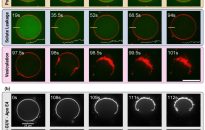AstuteAnalytica India Pvt. Ltd. Infrared-capable high-speed cameras gained substantial traction in 2024 as multiple aerospace facilities in the United States integrated 10 such systems to examine thermal signatures in rocket test stands. Oil refineries, aiming to monitor furnace operations, procured 7 infrared-based high-speed cameras that facilitated real-time heat mapping and potential leak detection. In another […]

Infrared-capable high-speed cameras gained substantial traction in 2024 as multiple aerospace facilities in the United States integrated 10 such systems to examine thermal signatures in rocket test stands. Oil refineries, aiming to monitor furnace operations, procured 7 infrared-based high-speed cameras that facilitated real-time heat mapping and potential leak detection. In another notable application, a Norwegian research station employed 4 of these devices to assess rapid temperature shifts within ice-core samples. By Resolution 1, 001-10, 000 FPS Processors By Spectrum
| By Throughput | >5 MP |
| Top Challenges | By Frame Rate |
| Lens developments positioned themselves at the forefront of high-speed camera market, illustrated by how 9 advanced lens models emerged catering to assemblies that require precisely calibrated optics. In the aeronautical engineering sphere, 3 newly constructed wind-tunnel facilities adopted these high-end lenses to capture stable and distortion-free footage at extremely high frame rates. This technical progression allowed for more exact measurements during turbulence and structural simulations. | High-Speed Camera Lenses Strengthen Demand across Scientific and Engineering Sectors |
| CameraLink | The high-speed camera market has gained phenomenal traction in 2023, with manufacturers like Photron, IDT, and Optronis pushing the boundaries of extreme frame rates and rugged designs. Meanwhile, consumer demand for slow-motion capabilities soared, as demonstrated by Sony delivering 2,000 high-frame-rate modules to robotics integrators in 2023, alongside Samsung’s introduction of two smartphone models boasting 960 FPS recording. Across industrial sectors, oil and gas facilities adopted 800 new high-speed cameras for pipeline inspection in 2023, while sports analytics firms invested heavily in real-time slow-motion solutions for instant replays. End users in scientific research also showcased ardent interest, with NASA integrating 14 advanced cameras for propulsion-testing scenarios and multiple aerospace labs employing newly released PCO dual-camera systems capable of 8 million frames of sequential capture. |
| Download Free Sample Copy @ https://www.astuteanalytica.com/request-sample/high-speed-camera-market | North America (32.1%) |
| By Frame Rate | Automotive manufacturers in the high-speed camera market also embraced infrared capabilities, with at least 6 new production lines adopting these solutions to enhance quality checks on engine hotspots and turbocharger performance. The medical domain saw 8 specialized clinics leverage infrared high-speed units to observe thermal shifts in tissue samples during experimental treatments. Beyond that, 5 steel plants purchased cameras equipped with infrared sensors to improve the monitoring of molten metal flow at exceptionally high temperatures. Such adoption across diverse industries underscores how, by 2024, infrared-focused high-speed imaging is unleashing clearer and more detailed insights than ever before. |
| Visible RGB | 30, 001-50, 000 FPS |
| Japan continued to make strides as well, with 6 electronics giants collaborating on integrated automation lines that feature real-time slow-motion capture for assembly verification. Meanwhile, 4 large-scale steel production sites in China adopted crash-proof, high-speed imaging setups to handle hot and hazardous conditions more effectively. Two prominent automotive companies in South Korea high-speed camera market introduced specialized high-speed cameras in their wind-tunnel testing labs, underscoring the region’s escalating interest in precision-measurement solutions. With these collective deployments, Asia Pacific has cemented itself as a thriving base for advanced high-speed camera implementations spanning industrial, scientific, and commercial applications. | Coax Press |
| By Component | USB |
| Astute Analytica is a global analytics and advisory company which has built a solid reputation in a short period, thanks to the tangible outcomes we have delivered to our clients. We pride ourselves in generating unparalleled, in depth and uncannily accurate estimates and projections for our very demanding clients spread across different verticals. We have a long list of satisfied and repeat clients from a wide spectrum including technology, healthcare, chemicals, semiconductors, FMCG, and many more. These happy customers come to us from all across the Globe. They are able to make well calibrated decisions and leverage highly lucrative opportunities while surmounting the fierce challenges all because we analyze for them the complex business environment, segment wise existing and emerging possibilities, technology formations, growth estimates, and even the strategic choices available. In short, a complete package. All this is possible because we have a highly qualified, competent, and experienced team of professionals comprising of business analysts, economists, consultants, and technology experts. In our list of priorities, you-our patron-come at the top. You can be sure of best cost-effective, value-added package from us, should you decide to engage with us. | In 2024, Asia Pacific witnessed a marked surge in high-speed camera installations as 8 semiconductor fabrication plants in Taiwan deployed next-generation devices to improve wafer-inspection procedures. India high-speed camera market’s expanding space research programs also embraced newer high-speed systems, exemplified by 5 newly commissioned test labs that rely on ultra-fast imaging to record rocket engine trials and satellite separation sequences. This region’s dynamic industrial growth, coupled with its dedication to advanced R&D, has significantly boosted the profile of high-speed camera manufacturers. |
| Others |
|
| Battery |
|
| US$ 7,036.5 million |
|
New Delhi, Jan. 15, 2025 (GLOBE NEWSWIRE) — The global High-speed camera market size is poised to reach a valuation of US$ 7,036.5 million by 2033, up from US$ 4,060.3 million in 2024 at a CAGR of 6.3% during the forecast period 2025–2033. By Throughput By Application AI-powered capture streamlines second-by-second defect identification in manufacturing environments. 2-5 MP (58.7%) 2-5 MP Demand for high-speed cameras soars amid automotive upgrades and laboratory breakthroughs. Next-level sensors capture intricate details at stunning frame rates. AI-driven interpretations reveal untapped data potential, while emerging thermal solutions promise to overcome obstacles in extreme industrial environments. Have questions? Inquire about this report before purchasing: https://www.astuteanalytica.com/inquire-before-purchase/high-speed-camera-market Contact Us:
Astute Analytica
Phone: +1-888 429 6757 (US Toll Free); +91-0120- 4483891 (Rest of the World)
For Sales Enquiries: sales@astuteanalytica.com
Website: https://www.astuteanalytica.com/
LinkedIn | Twitter | YouTube Limited heat dissipation hampers continuous high-speed operation in extreme settings. GigE About Astute Analytica Deep-learning systems crave detailed motion data for production-line automation breakthroughs.
- Infrared-Focused Devices Promote Greater Clarity and Significantly Expanded Industrial Imaging Frontiers
- Visible RGB (58%)
- VGA – 2 MP
By Spectrum
- Advanced sensor miniaturization facilitates portable yet ultra-fast professional-grade imaging solutions.
- Unprecedented crash-test rigor demands progressively higher frame-rate instrumentation worldwide.
- 10, 001-30, 000 FPS (33.1%)
- Top Drivers
- Market Forecast (2033)
By Component
- By Interface
- Processors (43.3%)
- Key Findings in High-Speed Camera Market
- Global High-Speed Camera Market Major Players:
- Prolonged filming difficulties arise from battery constraints during field testing.
0-2,000 MPPS
- CAGR
- By Industry
- Companies like Schneider-Kreuznach and Fujinon spearheaded these innovations, in the high-speed camera market unveiling 6 lens upgrades optimized for heavy vibration conditions—a boon for ballistic labs that rely on unwavering clarity under extreme testing. Meanwhile, 4 robotics research institutes integrated wide-aperture lenses into high-speed cameras to collate real-time data on robotic arm movements under dynamic loads. The racing industry also joined this lens revolution, with at least 5 major motorsport teams implementing specialized optics to refine race-car aerodynamic studies. Together, these developments reflect how lens components, once seen as peripheral, have emerged as catalysts for gleaning precise and high-value results in scientific and engineering endeavors.
- Asia Pacific Emerges as Rapidly Growing Hub for Advanced High-Speed Cameras
Lens
- Industrial & Robotics (35.8%)
- Largest Region (2024)
- USB (36.0%)
X-ray
- >10,000 MPPS
- Key Market Segmentation:
- 6.3%
- >5,000 – 10,000 MPPS
- Top Trends
10, 001-30, 000 FPS >2,000 – 5,000 MPPS Above 50, 000 FPS Data-intensive output strains existing storage technology during extended slow-motion capture. 250 – 1, 000 FPS By Region 2000-5000 mpps (36.1%)


















 @Boston Celtics #NBA #Basketball #Celtics #JaysonTatu…
@Boston Celtics #NBA #Basketball #Celtics #JaysonTatu…
 #NBA #basketball #NBAXmas #Jalen…
#NBA #basketball #NBAXmas #Jalen…







 #McLaren #F1 #Gingerbread #CapCu…
#McLaren #F1 #Gingerbread #CapCu…












 CMA Members get access to my “AXEL TECHNIQ…
CMA Members get access to my “AXEL TECHNIQ…




 #rugby #haka
#rugby #haka









